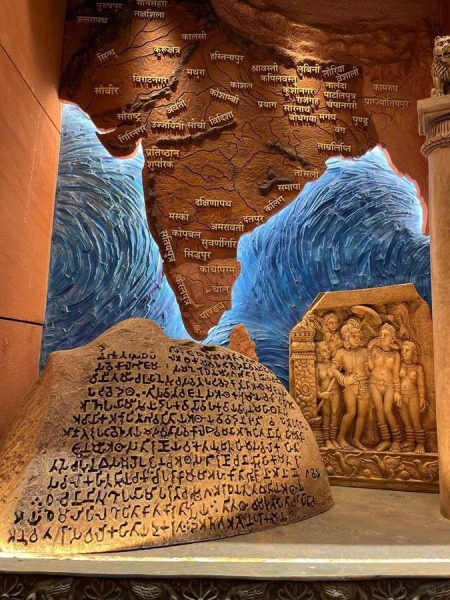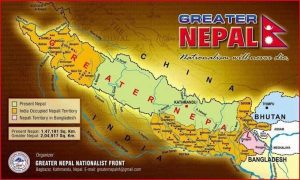
'Akhand Bharat' mural widens India's trust deficit with South Asia neighbours

The mural in India’s newly-inaugurated ‘people-centric’ Parliament building showing the extent of the Ashokan Empire has sparked a massive controversy across South Asia after senior BJP politicians alluded to it as ‘Akhand Bharat’.
Parliamentary Affairs Minister Pralhad Joshi triggered the row with his Twitter post on the map after the building inauguration. “The resolve is clear: Akhand Bharat,” he said. The BJP’s parent organisation, the RSS, tried to cool the tempers by describing ‘Akhand Bharat’ as a ‘cultural concept’ and foreign minister S Jaishankar carried it a step further.
Also read: India’s neighbours bristle at Akhand Bharat mural
At a press conference in New Delhi, Jaishankar remarked on the map, stating that it depicted ‘the extent of the Ashokan Empire.’ Then he sought to engage in some diplomacy. “It is not a political issue,” said Jaishankar, adding that “friendly nations like Nepal have understood India’s explanation, however, a nation like Pakistan does not have capability to understand it. This is a cultural map, not a political one. I hope our friendly neighbours understand it.”
Smoke and fire in Nepal
But during a week in Kathmandu, this writer found enough smoke and fire still smouldering in Nepal over the mural despite the Modi government’s efforts to clarify the position to Nepali Prime Minister Prachanda’s Delhi visit in June.
Balendra Shah, mayor of Kathmandu Metropolitan City, got a map of ‘Greater Nepal’ placed in his chamber as a symbolic counter to India’s ‘Akhand Bharat’ mural.
Opinion: Measuring ‘national news’ through Jaishankar’s barometer
“We have to remember the proud history of Nepal,” an aide of Shah told journalists when asked why the mayor had kept the unofficial map in his office. “Mayor Shah thinks that it gives a positive vibe of nationalism,” the aide said.

Constitutional expert Bipin Adhikari and others did remind Shah that as an elected representative who had sworn to uphold Nepal’s constitution, he could only use or display in office the approved map of Nepal.
Former Nepali Prime Minister KP Sharma Oli hit out at the Akhand Bharat mural as ‘unfortunate’ while Maoist leader Baburam Bhattarai interpreted the controversy as ‘the expression of trust deficit by India’s neighbours.’
Bangladesh seeks explanation
In Bangladesh, the Sheikh Hasina government also jumped into the row by seeking an official explanation on the Akhand Bharat map. Bangladesh’s Minister of State for Foreign Affairs Shahriar Alam said the embassy in Delhi ‘has been instructed’ to contact India’s MEA to ‘get India’s official explanation on this matter’.
Alam may have been asked by Hasina to seek clarification to defuse Opposition propaganda that seeks to project the ruling Awami League as an Indian stooge — a perception further cemented by some rare indiscreet comment earlier this year by Bangladesh foreign minister AK Abdul Momen when he said publicly that he had requested Delhi to do everything to keep the Awami League in power.
Also read: Once a whisper, RSS slogan of ‘Akhand Bharat’ now a dangerous chorus
Shahriar may also be trying to signal China, one of the strong backers of the Awami League government, because Dhaka sees Beijing’s support as crucial amid fears of a US-sponsored regime change operation unfolding in Bangladesh.
“There is a growing perception that the Awami League is drifting closer to China because Beijing’s UN veto is seen as crucial to stave off US-sponsored regime change,” said Bangladesh watcher Sukharanjan Dasgupta. “India’s failure to seal the Teesta river water sharing deal may be adding to Dhaka’s angst.”
Others see in this controversy a familiar BJP pattern of stoking a diplomatic controversy by encouraging motormouths to fire revanchist rhetoric even as the government takes a moderate official position. But that many feel can only add to India’s trust deficit in the neighbourhood.
(Subir Bhaumik is a former BBC correspondent and author of books on South Asian conflicts)
(The Federal seeks to present views and opinions from all sides of the spectrum. The information, ideas or opinions in the articles are of the author and do not necessarily reflect the views of The Federal)


